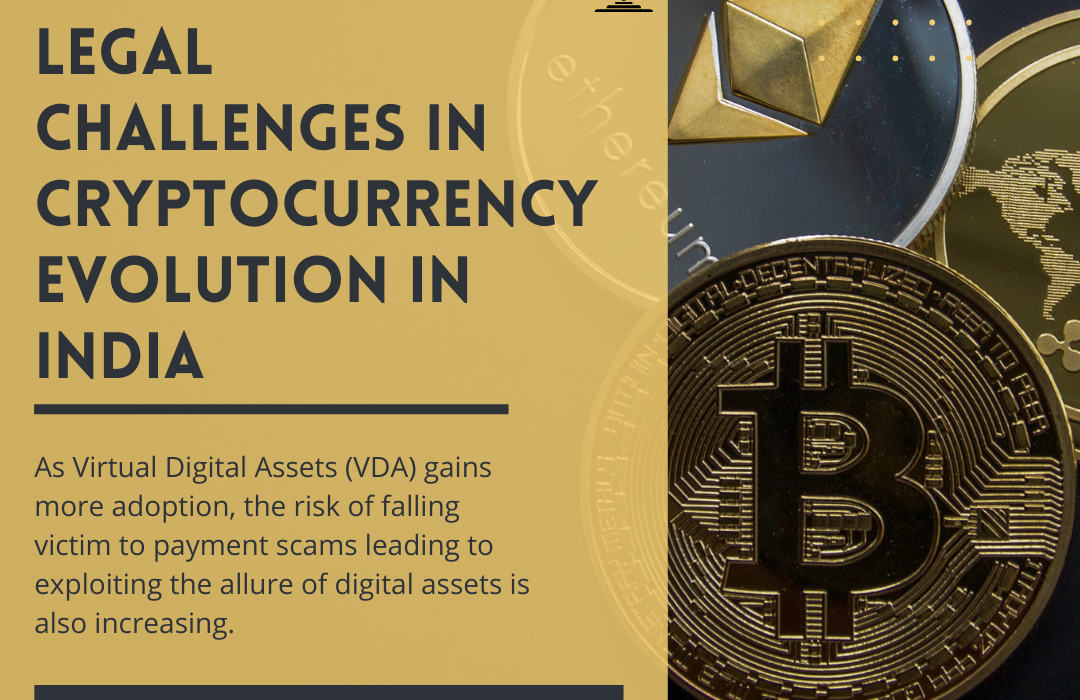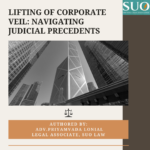Navigating Legal Challenges in Cryptocurrency Evolution in India
Introduction
As Virtual Digital Assets (VDA) gains more adoption, the risk of falling victim to payment scams leading to exploiting the allure of digital assets is also increasing. These frauds and security breaches are nowadays becoming more common, thereby questioning the adaptability of VDA.With the growing issues about scams, the need for prudentunderstanding among enterprises, individuals, and regulatory bodies are needed along with the strict regulations. These cryptocurrency scams frequently include fraudsters disguising themselves as authorities or trustworthy organisations in an effort to fool individuals into sending money or disclosing private information’s. Therefore, organisations and individuals can safeguard their data and financial assets by being aware of the strategies used by the scammers.
It is to highlight that like other countries, India isalso facing difficulties in curbing the rise in crypto scams. ‘Broadband India Forum’ released its report that states that theft of cryptocurrencies has been increased with around $3.2 billion worth stolen in 2021, which is a huge rise as compared to 2020. But unfortunately, as of not there isn’t a specific legislation or regulation in India that controls the creation, application, and maintenance of distributed ledger technology, or “DLT” and for which India is continuously puttingefforts to manage and reduce the rising number of crypto fraud cases. The Reserve Bank of India (RBI), Security and Exchange Board (SEBI), Enforcement Directorate of India (ED), Cyber Emergency Response Team – India (CERT-IN), and other regulatory bodies are actively working with the Government of India (GoI) to implement stringent regulations.
Overview of Crypto related scams in India
The scams related to Cryoto currencies in India are mainly done from several outlets, such as social media, dark web, or professional platforms like LinkedIn etc. Therefore to understand the nature of cryptocurrency transaction is very essential because its immutability and irreversible nature set them apart from the traditional financial transaction. There is no regulatory protections or government‘s assurance towards the web of crypto activities. While there are numerous ways through which the fraud could be carried out, but few are particularly common in the cryptocurrency sector and that regulators and investigating agencies are well aware of. Here are a few of the most common cryptocurrency scams conducted are as follows:
- In one such incidence, wherein the Delhi Police registered the case against CoinDCX following numerous user complaints. Victims claimed to have come across a fake mobile application which was in resemblance to the company’s official application. Because of the fake app’s meticulous design, which mimicked the original’s user interface, users were misled into thinking it was real. Users that submitted personal information into the fake app or made investments which leads to the financial losses as a result of this scam. The business made it clear that the scam had nothing to do with their actual platform, but rather with the fake website. They drew attention to the persistent problem of fraudulent websites and applications imitating authentic financial services in the fintech industry. This case amply highlights how important it is for users to carefully check the legitimacy of cryptocurrency apps and websites before using them or making investments.
- In another instance of GainBitcoin, this was founded in the year 2015 by Mr Amit Bhardwaj, who created an alluring story about Bitcoin investing. The Profitable returns were promised during the scam, which was purportedly made through cryptocurrency trading and mining. But in order to maintain dividends, it significantly depended on an ongoing stream of new investors, which is a traditional sign of a Ponzi scheme. This was a sophisticated operation that further entangled investors in this fraudulent web by using multi-level marketing (MLM) tactics to spread the word and switching to an internal cryptocurrency token when the Bitcoin became scarce.
- The impersonation scam, in which some of the individuals pretend to be agents of businesses in an effort to win and establish trust with the potential victims. This scam was revealed by an arrest made by the Dehradun Cyber Police, wherein the gang involved was accountable for aRs 13 crore in pursuance to the nationwide fraud. A victim who was tricked into sending Rs 18, 11,000 through many online transactions filed a complaint, which started the investigation. That the victim was sending money straight to the scammers while thinking he was making cryptocurrency investments and finishing lucrative assignments. Two people in Rajasthan were taken into custody after the police’s investigation revealed the gang’s strategy for transferring the money between accounts in Delhi and Jaipur. The investigation revealed that it was a huge scam which is connected to other complaints lodged in additional 11 states. Henceforth, this scam’s extensive reach and complex network are brought to light the necessity for internet users to exercise extreme caution and the significance of confirming the authenticity of remote job offers.
These scams and fraudulent schemes are frequently tainted with the substantial profit possibilities of the quickly developing bitcoin industry. As a result, before making any cryptocurrency transactions or investments, enthusiasts and investors must conduct thorough personal due research. The temptation of rapid money can occasionally impair judgement and cause people to fall victim to fraudterstraps. However, it is possible to navigate the crypto technology if one has enough cautious awareness and has adopts aprudent approach.
Regulatory framework and conclusion
There is not a specific legislation or regulation in India that controls the creation, application, and maintenance of distributed ledger technology (DLT)/ cryptocurrency technology. As the said technology has become popular in India over the past several years, the government has adopted a favourable position towards its implementation but later the Government and the Reserve Bank of India (RBI) raised concerns in order to warn the public that virtual currencies are not a legitimate form of payment and that companies running virtual currency schemes or otherwise dealing with virtual currency lack the necessary licences or authorization.
India’s approach to regulating cryptocurrencies has been the journey of providing caution to the public at large and judicial pronouncement. From 2013 to 2018, the Reserve Bank of India (RBI) regularly through its notification highlighted the possible financial risks connected to cryptocurrencies, hereby recommending public caution rather than imposing a complete prohibition. However, in 2018 the RBI took a firm stand to separate cryptocurrency exchanges from the banking industryby barring regulated entities from engaging in virtual currency transactions. This prohibition was challenged in the case of Internet and Mobile Association of India vs Reserve Bank of India Writ Petition (Civil) No.528 of 2018, wherein the RBI’s restriction was overturned by the Hon’bleSupreme Court of India. The Court deemed the restrictive measure to be unreasonable even though it acknowledged the RBI’s jurisdiction to govern the domain.
Following the Hon’bleSupreme Court’s decision, the RBI made it clear that the earlier prohibition was no longer in effect and that companies that deal in cryptocurrencies had to adhere to strict regulatory guidelines. These guidelines include Know Your Customer (KYC) practices, Anti-Money Laundering protocols, and Counter-Terrorism Financing (CTF) protocols. They need to make sure that they are in compliance with the Foreign Exchange Management Act (FEMA) and the Prevention of Money Laundering Act (PMLA).
In accordance with the Information Technology Act of 2000, the Indian Computer Emergency Response Team (CERT-in) issued an order on April 28, 2022, which requires the timely reporting of various cyber threats and lays out important recommendations for information security practices. Identity theft, spoofing, phishing, Denial of Service and Distributed Denial of Service assaults are among the incidents that need to be reported. The spread of fake mobile applications is likewise addressed by the directive.
Furthermore on March 7, 2023, the Ministry of Finance changed the PMLA to include the Virtual Digital Assets (VDA) sector in a more comprehensive way. This crucial modification expanded the scope of the PMLA to cover decentralised digital transactions by designating as “Reporting Entities” both individual operations involving VDAs and Virtual Digital Asset Service Providers (VASPs). This amendment gave the legal system more authority to prevent and deal with illegal activity in the digital asset area.
Although there aren’t any specific regulations in India yet, cryptocurrencies pose special legal issues in the rapidly developing digital age, necessitating the creation of new regulatory frameworks.In conclusion, as financial transactions move more and more into the digital sphere, there will be lots of cases with complex issues brought about by the blockchain development. There is a need for strong legal frameworks that ensure the security and integrity of cryptocurrency transactions by comprehending the subtleties of identity theft, hacking, and fraudulent trading platforms. Significantly, due diligence is also crucial to protecting yourself from frauds since once a transaction is started, it cannot be reversed or retrieved. Before engaging in any cryptocurrency-related transaction, whether it is for personal or professional use, one should exercise prudence. But most importantly, a clear legal framework must be established to identify and manage criminalities through VDAs quickly and further a stringent statutory penalty must also be determined.
Authored by: Anukriti, Legal Associate, SUO Law Offices.



